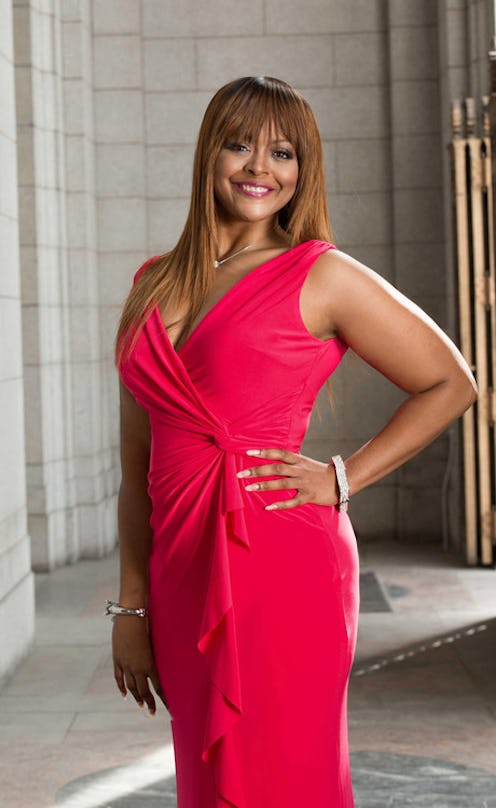Entertainment
This 'BAPs' Star Raises Some Important Questions

Oh reality television. You giveth and you taketh away. For every Brody Jenner speaking out against his sister's harassment on Keeping Up With the Kardashians, or uplifting bridal story on My Fair Wedding, you give us things that leave a sour taste in our mouths. Enter BAPS , Lifetime's new attempt at diversity, that's also gaining some ire for its name. And as offensive as the title and very concept of BAPs is, it also introduced us to Anisha Morrell, a cast member that might just make the show worth watching.
If you've been following the controversy of BAPs, you'll recall the title is derived from the loaded term JAP, which stands for Jewish American Princess and carries a certain degree of offense (not to mention misogyny, because women are just totally materialistic and vapid right?). Similarly, BAPs stands for Black American Princesses, though Lifetime also adds Princes to the term.
It at once implies women can't be proud of the spoils of their success, and that women from these backgrounds who might have a certain degree of financial power are intrinsically shallow. The term wouldn't hit so hard if we weren't bombarded with images of men in power revelling in both their success and their material gains. For every outlet gushing on a luxury car purchase by some playboy, there is another chiding women for daring to enjoy their money.
So what's the real story with BAPs? At its core, it's really a story about financially independent women and a few men, with some reality drama thrown in for good measure. Nothing you wouldn't see on a Real Housewives franchise, save for the name.
Lead among the BAPS cast is Anisha, veteran of debutante balls and elite private schools, who has a lot to say about BAP culture. In her intro clip, Anisha mentions that divorce is seen as a terrible stigma in the "BAP world," signifying that traditional mores regarding family reign pretty high. That's definitely something that separates these real women from their other reality counterparts, so it's interesting to see them navigate their independence and motherhood while still being expected to have a male partner.
Only a couple of episodes in, and BAPS has Anisha and her costar, coffee entrepreneur Jason, arguing about what the BAP title even means in relation to "the black brand." Anisha is essentially accused of being "bougie," and denying her blackness through her BAP status (of the cast members, she is the one who most readily self-identifies as a "BAP"). While some laud the show as a portrayal of inspirational upward mobility, Jason himself is not sure, saying in the clip above that a "false sense of security hurts us as African-Americans."
Anisha is going to be an interesting character to watch this season. Jason also tells her to "be happy being black" implying he thinks her outlook and lifestyle is incompatible with blackness or somehow makes her less black. It's interesting to think about, since Jason himself is a pretty well-off entrepeneur and heads up his own coffee empire, but still associates himself with what is "real." Is this another case of women's enjoyment of affluence and success seeming shallow?
Anisha herself finds the BAP label harmless, going so far as to say "who cares?" in a talking head segment. While Jason's points are valid that a focus on black affluence ignores and undermines significant problems, Anisha does strongly defend herself and her lifestyle, calling Jason out on his definition of the "black brand" really being the "black man's brand."
Anisha's sendoff line in the argument "who you want me to be doesn't matter to me" is a way more baller sentiment than I was expecting out of the show so it was pretty refreshing to see. Though conservative Gina takes Jason's side in the argument and wishes Anisha were more well-mannered, it's exciting to see a strong woman stand up to a man when her identity is challenged.
Whether or not the title sits well, BAPS is certainly starting to delve into some pretty fascinating conversations about not just race, but gender as well, and how they affect each other. Anisha does say Jason is "truly African-American" which begs the question, how does she define herself? It'll be interesting to see how her identity develops over the course of the show, but for now, I'm all Team Anisha.
Image: Lifetime